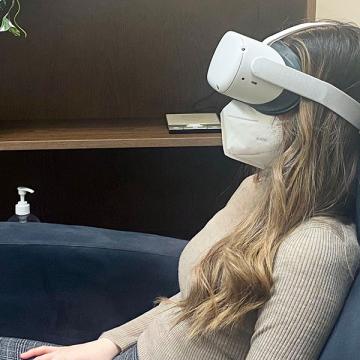
Virtual reality innovation in exposure therapy
What do you think of when you hear “virtual reality”? Virtual reality...
Amid a rising death toll in opioid-related overdoses and an ongoing public health emergency in British Columbia, the Office of the Vice-President Health has teamed up with the BC Centre on Substance Use to improve substance use and addiction training for health profession students at UBC.
“As the province continues to manage a complex and devastating opioid epidemic, addiction and mental health will be an important focus,” said Dermot Kelleher, UBC’s Vice-President Health. “We are developing a strategy to respond to the epidemic, part of which includes our recent hire of a Substance Use and Addiction Partnership Manager.”
Liz Yue stepped into the newly created position, which is jointly appointed by UBC Health and BCCSU, last month. “Over and over we see accelerated responses to the overdose crisis face the same limitation: a lack of sufficiently trained, interdisciplinary health professionals,” she explained. “We need a coordinated, collaborative education strategy to ensure that our health profession graduates enter practice with foundational training in substance use and addiction prevention, treatment and recovery.”
The creation of the Substance Use and Addiction Partnership Manager position is a first step in that direction, Yue continued, and will build upon existing curriculum. “Most health care professionals know how to treat someone with diabetes or cardiovascular disease. But when it comes to substance use disorders, there is a lack of basic knowledge of available treatment and resources.”
This is not just a gap in the public health system, it is a dangerous omission, Yue added: “If someone living with a substance use disorder seeks care and their provider can’t adequately treat or refer them, it can be life threatening. It’s a failure in health care provision and it can add to the stigma that substance users already experience, which in turn negatively affects their health.”
Cheyenne Johnson, Interim Co-Executive Director of the BCCSU, said putting a bandage on the overdose crisis by training health care professionals in the field is not a long term solution. “BCCSU is bringing its resources, educational platform and research to the table. Working with UBC Health, our shared challenge is to translate that into collaborative, interdisciplinary, evidence-based training for health care students.”
Johnson knows firsthand how important this is: during her undergraduate nursing training, she received almost no education in substance use and addiction. “It was disappointing and shocking how unprepared I was, especially because of the prevalence of substance use among co-workers as well as the patient population.” Johnson said more and better training for students in the prevention, screening, treatment and recovery of substance addiction could be transformational. “The potential in terms of improving patient outcomes and the health care system more broadly is incredible.”
Yue understands this potential and is keen to get to work. She credits growing up in Vancouver with inspiring her to pursue a career focused on public health and in particular, substance use and addiction. “I was aware of the Downtown Eastside and the opening of Insite, so I learned about the challenges of addiction from a young age. It was always in the background.” Now Yue will help bring substance use and addiction education to the fore, collaborating with 17 health profession programs across both UBC campuses to enhance learning opportunities for students.
“This role is an opportunity to make a significant impact on the education and training of our future health care professionals in the critical but underserviced area of substance use and addiction,” said Vice-President Kelleher, “We welcome Liz and look forward to working with her.”
UBC Health works under the auspices of the Office of the Vice-President Health to enhance interdisciplinary health education, research and systems by fostering collaboration across disciplines and faculties at both UBC campuses, as well as with institutions and government organizations around the province.